At the beginning of 2019, Redfin had a board meeting to discuss Redfin’s development and retention of real estate agents. Every three months, we open each board meeting with an update on our efforts to be real estate’s best employer, but about once a year we discuss the topic in more detail, presenting data on the likelihood that an agent will leave Redfin, and comparing that to industry data gathered from the Multiple Listing Services brokers use to list properties and track an agent’s sales.
What we found is that agent attrition has increased over the past two years, at Redfin and industry-wide:
| Brokerage | Q3 ‘15 vs. Q3 ‘16 | Q3 ‘16 vs. Q3 ‘17 | Q3 ‘17 vs. Q3 ‘18 |
| Redfin | 15% | 18% | 16% |
| All Brokerages | 27% | 30% | 32% |
We talked about how much to charge customers, how much of that money should go to agents, and what support staff, policies and tools could make an agent’s life easier at Redfin. But we also wanted to understand, at a time when billions in private capital is being invested in U.S. real estate brokerages, why agents across the industry seem unsatisfied with their jobs. We wanted to understand our industry better, as seen through the eyes of the people actually selling houses, the real estate agents.
We commissioned a survey, paying nearly $30,000 to gather information from agents about commissions, hours, sales volume, returns on lead-generation investments, income, career satisfaction, customer demographics, and diversity. And now, we’re publishing the result, presenting the findings in a keynote at Inman Connect on July 24, 2019, and publishing this paper on the same day.
Who Responded to Our Survey and Why
The March 2019 survey reached 500 U.S. real estate agents across 50 markets; we only solicited agents with at least one sale in the past year, and no market accounted for more than 6% of the survey sample. We reached most of the agents via an email address in the local MLS, which allows the use of email addresses for research purposes, supplementing that approach in large markets with email addresses from a research firm, Lucid. Respondents were contacted by Lucid, not Redfin, and did not know that Redfin commissioned the study. Respondents earned a gift card or charitable donation worth $50.
80% of Respondents: 4+ Years of Experience
We expected that most of the respondents would be agents new to the industry, since those would be the folks with the most time to respond to a survey for $50, but more than half had 10 years of experience or more and 80% had at least four years of experience:
This gives us a good sample of people who really know the industry, and can comment on how it has changed over the past decade.
Respondents’ Median Age: 50+
Respondents’ median age was over 50 years old, consistent with the National Association of Realtors’ data on members’ median age of 52. This career has the same median age as physicians, who typically have to complete at least eight years of training after college:
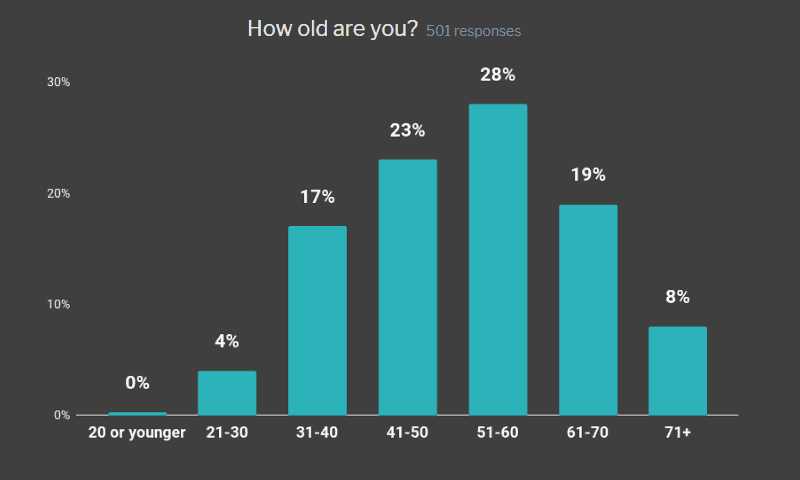
It’s understandable that agents would be older than people in most professions, since one de facto prerequisite for many agents to sell a house is first owning one themselves. But the seniority of the typical agent creates a demographic issue for our industry, as the largest group of Americans, millennials, is now getting ready to buy a home:

As a younger CEO of Redfin, I remember being surprised on attending my first real estate conference at the seniority of its attendees compared to the crowd at software conferences I’d been used to attending. Of course now that I’m approaching the median age of an agent, and look like I’m well past it, the people at conferences seem so lively and young! It’s still a major challenge, for recruiters at Redfin and at other brokerages, to make the career of an agent appealing not just to established players, but to a new generation of talent. The median age of a Redfin agent is 41.
Median Sales in 2018: 7 – 9
The median number of sales closed by respondents in 2018 was 7- 9, just below the NAR median of 11:
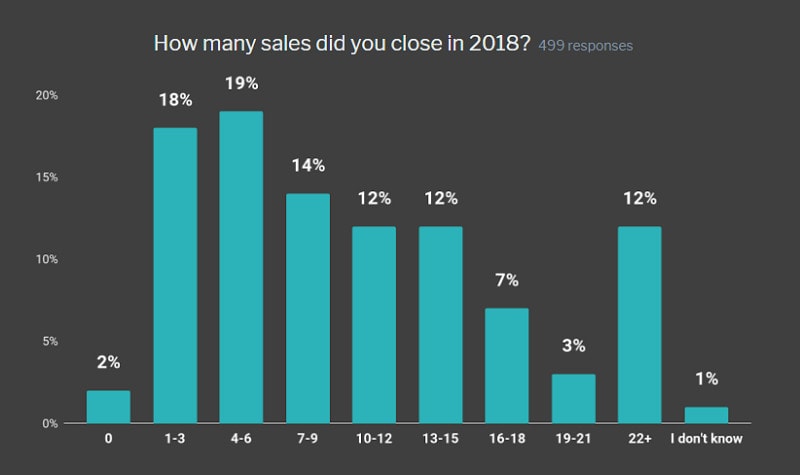
2018 sales may have been lower than in the past just because of the unexpectedly sharp correction in the second half of the year. Had we included the many agents in the industry who didn’t close a single sale last year, the number would have been even lower. It’s still one of our industry’s great challenges to bring the productivity of the average agent up, so that each agent earns more, and the consumer gets an agent with more transactional experience.
Nearly Half of Respondents Have Second Jobs
One consequence of low productivity is that nearly half of respondents worked other jobs to supplement their income as an agent:
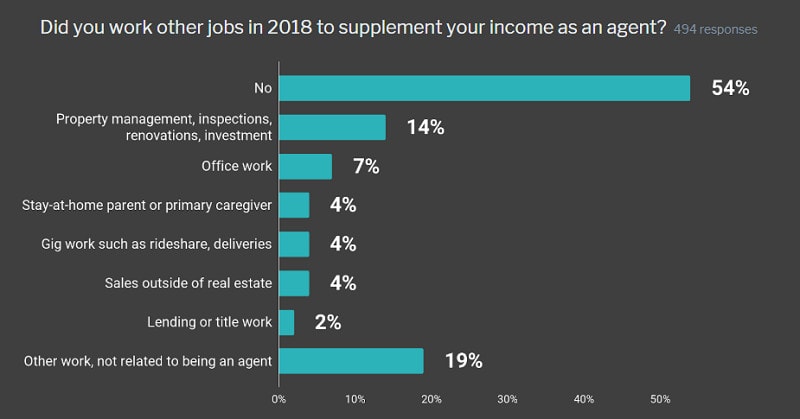
These findings are a reflection of the entrepreneurial nature of the people drawn to real estate, but also a challenge to our professional standards. Even if we exclude the folks whose work is related to being an agent, as a lender, investor or property manager, that still leaves more than a third of the agents surveyed who aren’t able to sustain themselves full-time within real estate.
Overwhelmingly Proud of Service
The good news is that agents are overwhelmingly proud of their service:
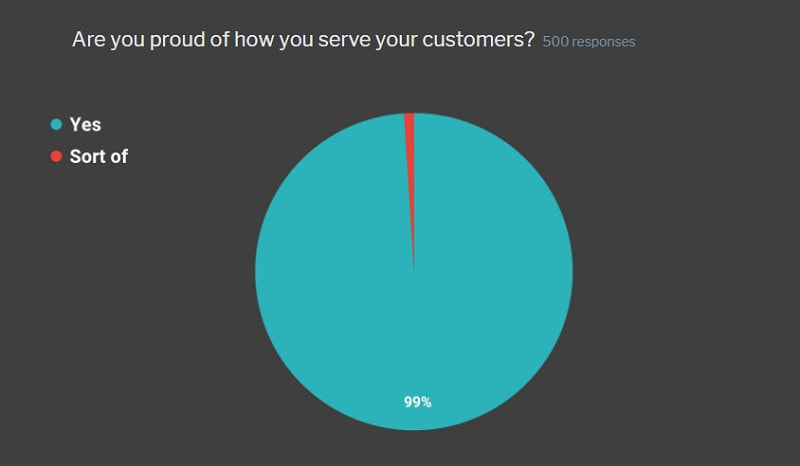
We’re not sure that the people selling any other good, be it cars or clothes or software, would be as proud of their service as agents are of our service. We expected this result, but were nonetheless heartened by it.
Willingness to Recommend Career Is Low
But career satisfaction is low, even among agents selling more than the median number of homes in 2018. We measure career satisfaction as a net promoter score, subtracting the people who dislike the career from the people who love it, and dividing the difference by the total number of respondents. Negative scores indicate that more people dislike the career than love it:

Twenty-one percent of all agents would recommend the career, scoring their likelihood to recommend it as a 9 or 10; among agents with 10+ closes, this number was 24 percent. Maybe this is the nature of work, for it to sometimes feel like drudgery, but at Redfin we still feel aspirational about how good a career in real estate should be, so we view this data not as a critique of the industry, but as a challenge for us to address.
It’s always dangerous to speculate on the rationale respondents may have had in answering a question, but since the survey also discovered that respondents themselves seem to have decent income and many aspects of the work that they like, we should remember that the survey question asked about the likelihood of recommending the career to others. One possible interpretation of this result is pessimism about the long-term prospects for people just starting a real estate career, because of changes in the industry wrought by technology or the increasingly competitive housing market.
Respondents Like Serving Customers, Not Prospecting
When asked about the best aspects of being an agent, respondents put customer relationships first and prospecting for customers last, confirming that most agents would prefer to spend our time on service:
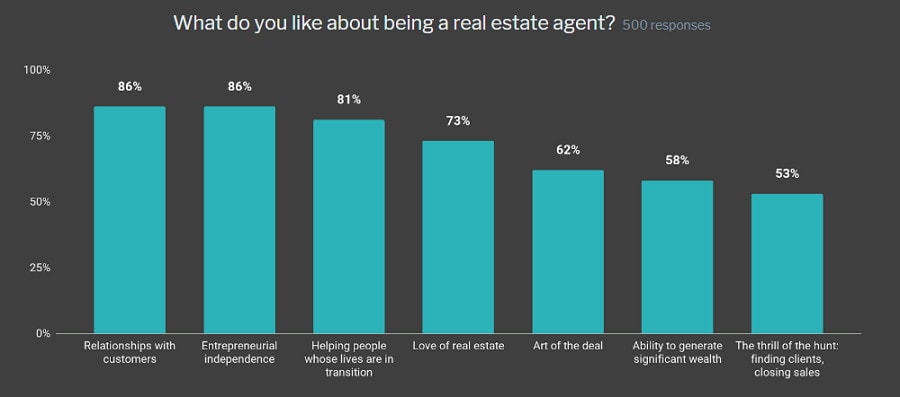
This distaste for prospecting is one reason Redfin has been able to recruit agents so readily, as Redfin recruits many of our agents’ customers through our website, but our challenge has always been to give our employees a steady supply of customers who want to tour homes while still protecting the entrepreneurial independence of a traditional agent’s life, with the latitude to take a weekday morning off for a swim.
The Worst Part of the Job: The Dry Spells
The cost of entrepreneurial independence for most agents is that income can vary so much from month to month and from year to year, which is what agents disliked most about a real estate career:
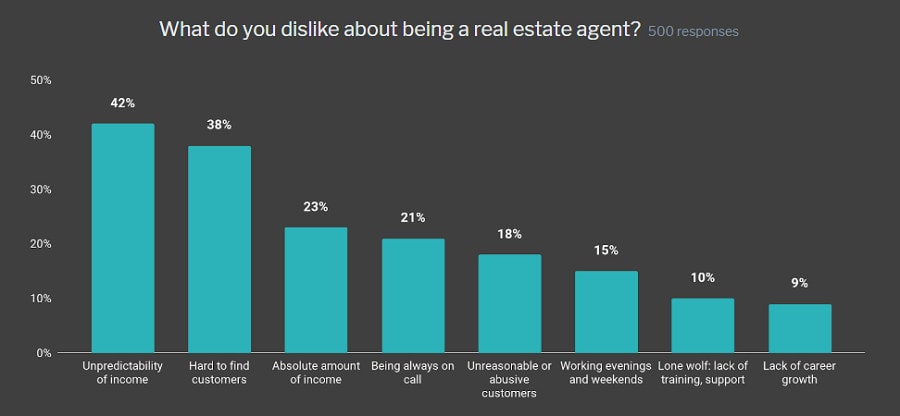
It was no surprise to hear that agents wished they had more customers and more income, but we still expected that always being on call nights and weekends would be a more common complaint among survey respondents, as it’s a major challenge for Redfin’s agents, even though we’ve hired support staff to field many of the initial inquiries our customers have.
The Toughest Customers: Millennials
What wasn’t a surprise was the data about which customers are easiest to serve:
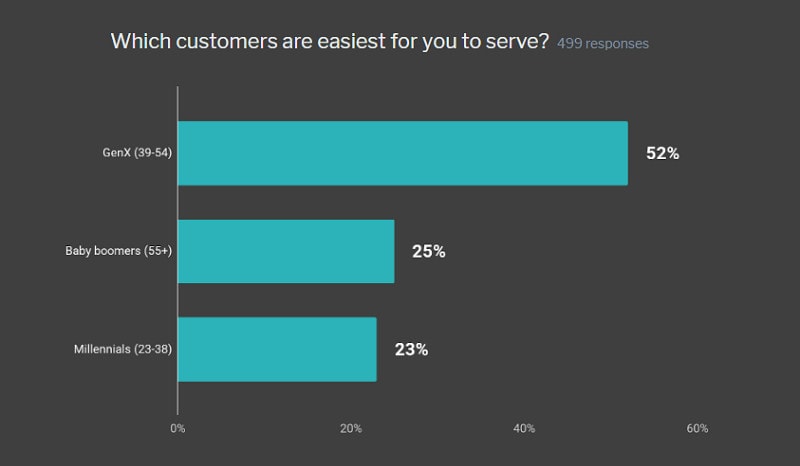
The differences between millennials and boomers wasn’t statistically significant, but it was still notable that millennials led the pack. The inspiration for this question came from a conversation I had with a millennial real estate agent in Redfin’s San Francisco office, about how we could use our website to better qualify the Redfin.com visitors on our site who asked for service from a Redfin agent.
“Is there a way we could filter out the millennials?” she asked me. This was only a joke, as we would never avoid serving any customers based on age, race, religion, military service or sexual orientation. But it stood out because until that point, agents had worried about Baby Boomer customers who were supposedly less comfortable with technology or didn’t have the Redfin application on their phone.
But this agent, and many others since, said that millennials are accustomed to ordering and canceling ride-shares and meal delivery on their phones, and thus don’t feel the same sense of personal obligation when working with a buyer’s agent who by and large only gets paid when a sale is made, after months of service. The other problem of course with younger customers, many of whom have student debt, is their struggle to afford their first home.
The answer isn’t, obviously, to turn our nose up at these customers, but to find ways to adapt our service to the on-demand world we now live in by organizing agents into teams, and to develop a consultative approach to the affordability challenges that are preeminent for so many homebuyers, by training agents on all the ways a home can be financed.
Commission Rates Mostly Stable, Modest Decline
Another factor putting pressure on agents is the fears over declining commissions. When we asked agents with five years of experience or more, 31% said commissions had declined over the past five years, and 14% said commissions had increased:
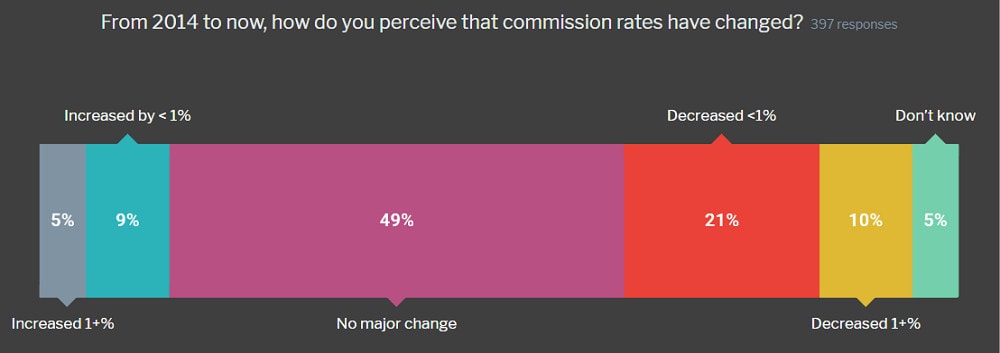
We’ve mostly been surprised at how stable commissions have been, as a mission of our company has been to find a way to use technology to give real estate consumers a better deal, while still paying our agents and other staff well. The argument made by lawyers and journalists that there’s no competition in real estate has been belied by the $44 million Redfin has spent in 2018 advertising our low listings fees; what’s closer to the truth is that low pricing has helped Redfin grow, but many consumers who are aware of Redfin’s pricing still often choose an agent charging 5% or 6% in total commissions.
Increased, Not Decreased, Costs to Meet a Customer
While many have expected the internet to lower commissions, few have noticed that it may have actually increased marketing costs. The return on investment for the classified ads real estate agents once ran in the newspaper was once seen as low, but among the survey respondents with five years of experience or more, marketing spending per closed sale has only increased in the digital age. Nearly half of respondents with an opinion believed advertising costs had increased, while only 10% believed those costs had decreased.
Only people who had spent money on lead-generation sites were allowed to respond, numbering 395 in total:

These marketing costs are ultimately borne by the consumer paying real estate commissions. This hasn’t been the impact that most imagined the internet would have, but it points to the importance of brokerages either being able to generate demand for their agents through their own online presence, or charging the agents less to work at the brokerage, so the agents can afford to spend more on advertising. And it corroborates a trend across industries, that the rise of a small number of large-scale websites for consumers to access information and make product or service decisions has let those sites capture more of the total dollars from a sale each year.
Respondents Mixed on ROI of Lead-Generation Websites
Consistent with this finding, respondents were mixed on the return on investment for lead-generation sites, tilting slightly toward a favorable opinion:
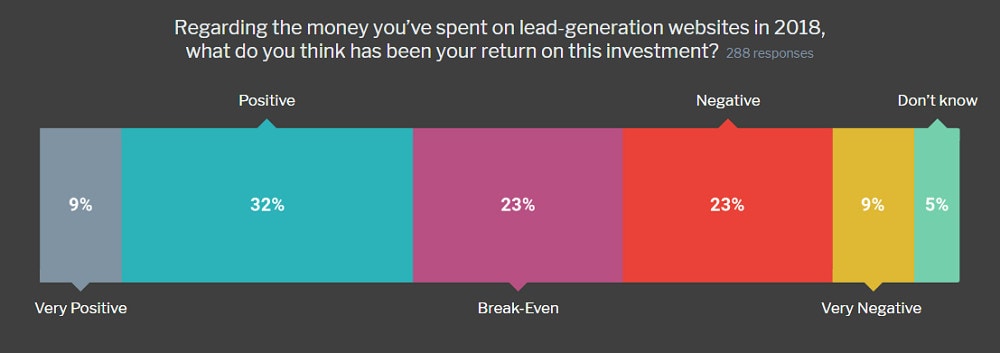
The Internet Has Decreased, Not Increased, Agent Productivity
The other finding that surprised us was how respondents with five years or more of experience felt about the internet’s impact on agent productivity, with 33% saying it took more time and effort to close a sale because of the internet and 32% saying it took less. Among the most opinionated folks, nearly double said that the internet significantly worsened, rather than significantly improved, agent productivity:
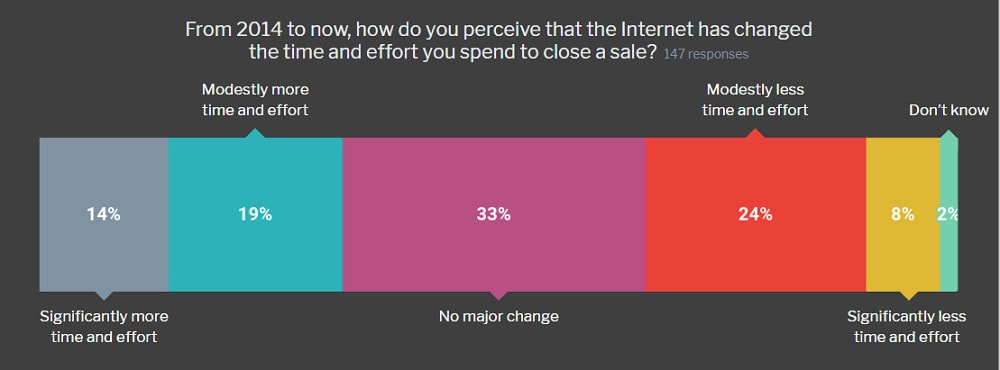
This feeling may stem from the number of consumers who use the internet to contact multiple agents, touring a home with whoever responds first, and then repeating the process for each service request. It may also be a complaint about the self-educated consumer, who gets unreliable information from the internet that an agent can contradict only at her peril. It may be a general attitude about the internet from a group of agents who have learned to be wary of technology.
But all of us running brokerages should again take this finding as a personal challenge, to use technology to make agents’ lives better. Redfin has ample experience with spending millions to build software that only burdens our agents with another tool to learn or another task to complete.
We have, as a result, become less opinionated about what an agent should do and more careful to build software in support of what an agent already does. And we’ve become more patient, recognizing that the first deployment never works, and instead spending years collaborating with the agents who use the software, and iterating on small improvements that are crucial to make the software actually work in the real world.
But Experienced Agents Report Modestly Rising Incomes
The good news is that, despite the concerns over marketing costs, commissions and technology, agents with five years or more of experience have still reported modestly rising income.

At some level, this result should be unsurprising, as real estate is a profession where you get credit for time served, accumulating repeat customers and referrals. Redfin has made great strides in rewarding our best agents, with an income exceeding $500,000 in 2018 for our top producer, but we still have work to do to reward our agents cumulatively, for developing a following loyal not only to the brokerage but to an agent.
Median Income: Between $25,000 and $50,000
But still the pay for most respondents was low, with median incomes after expenses between $25,000 – $50,000, which is consistent with the median income of $41,800 reported by the National Association of Realtors:
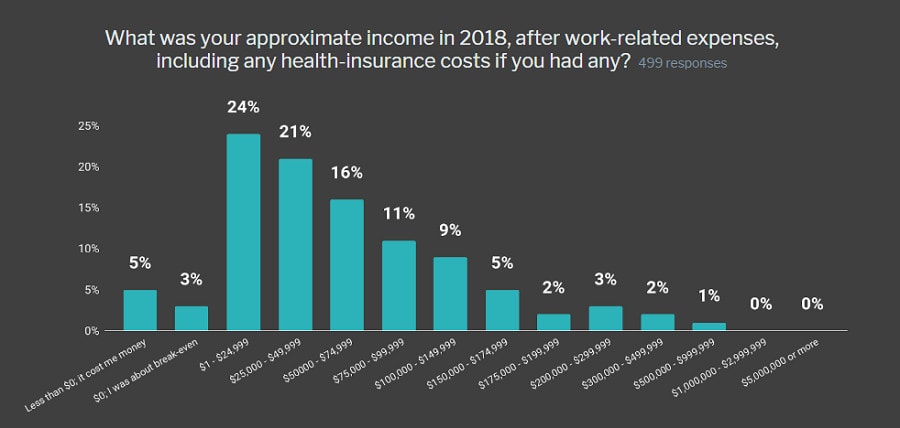
This range could be characterized as a good wage for people with a wage, where the pay is guaranteed and the work isn’t stressful. But many agents invest their own money to get started in real estate, and feel the pressure to drum up business, and work nights and weekends when customers are available. Real estate is, like the rest of the economy now, mostly a winner-take-all business, with a few agents earning outsized commissions and others barely earning enough to buy a home themselves.
Redfin believes real estate should give the best agents a path to significant wealth, but the profession can also be one of the last with reasonably high earnings for a broader set of people, with a very wide range of skills, education levels and backgrounds. At more than one million members, the Realtor career is one of the last broad platforms for middle-class and upper-middle-class prosperity, but we have to invest in the training, tools and recruiting to get most agents earning closer to $75,000 – $100,000 each year. The typical Redfin agent reaches an income of $97,000 after nine months on the job; our goal is for that to reach $100,000 by 2020.
The Median Time to Earn a Consistent Income is 6 – 12 Months
It’s especially important for agents to reach this income level given how long it takes them to make money. The median number of months respondents needed to earn a consistent income was between six and 12:

This is one reason why real estate is less diverse as a profession than others, because so few people can afford to go without an income while finding their first clients and guiding those clients through the six-month process of settling on and buying a home.
Redfin pays a salary, benefits and bonuses for hosting tours and listing consultations, but still roughly 70 percent of a Redfin agent’s pay is variable, which means that new agents still must wait two or three months until their first sales close before generating a decent income. We’ve tried offering a stipend, accelerating training, and increasing the number of new customers from Redfin.com that an agent meets after completing our training; now we’re asking our managers to help new agents close five deals in their first four months on the job, because the Redfin agents who don’t clear that threshold have historically had high rates of attrition.
The obvious commercial benefit is a reduction in turnover and an increase in sales, but we also want to increase diversity, making the career of a Redfin agent more welcoming to people who don’t enter the profession with enough savings to get through six months of few sales. Our efforts so far are one reason why Redfin’s agent ranks are significantly more diverse than the industry overall, but we still have a ways to go.
Work-Life Balance Is An Issue for About a Third of Agents
The most surprising finding from the survey for Redfin was the lack of concern about the balance of time spent between work and personal life; only about a third of agents registered some concern about this:
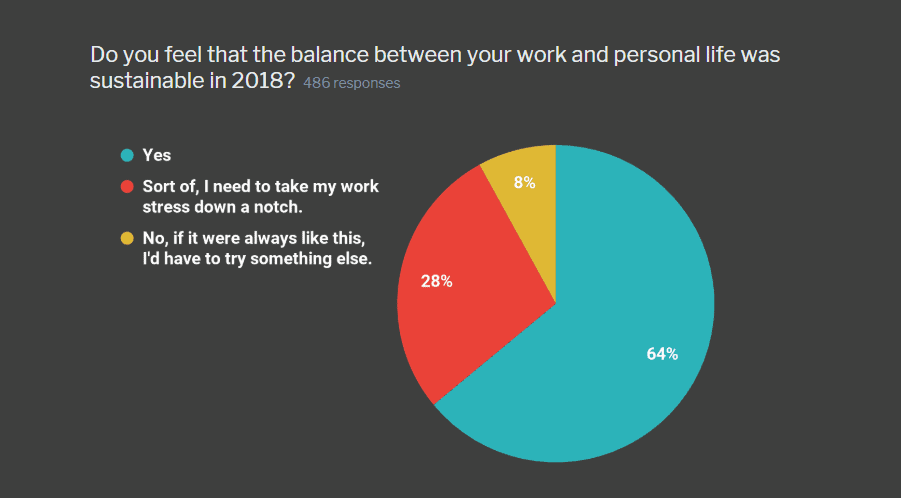
Perhaps because a Redfin agent can choose to connect with a large number of customers from our website and mobile applications, work-life balance for our agents is one of the company’s pre-eminent concerns. To protect both the agent and the customer, we began in 2018 limiting the number of new customers a Redfin agent can serve each month.
We’ve also offloaded tasks from the agent, for preparing listing presentations, screening telephone inquiries, analyzing home prices, booking home tours, hosting some tours, preparing offer paperwork and coordinating closings; we either shift the work to support staff or automate it outright. What we’ve found is that productivity increases rarely reduce agent workloads, but instead just let agents take on more customers.
When we’ve increased the amount we pay for a sale, hoping that agents would earn the same income on less work, it has only encouraged agent to work more. We’re now developing new incentives to reward results beyond productivity, for agents who have high numbers of repeat and referral customers, or who inspire colleagues. This is an area where we need to improve compared to our industry peers.
Agents’ Median Hours Per Week of Work is 30 – 39
That said, many agents have good reason not to be worried about workloads; the typical agent works less than 40 hours per week:
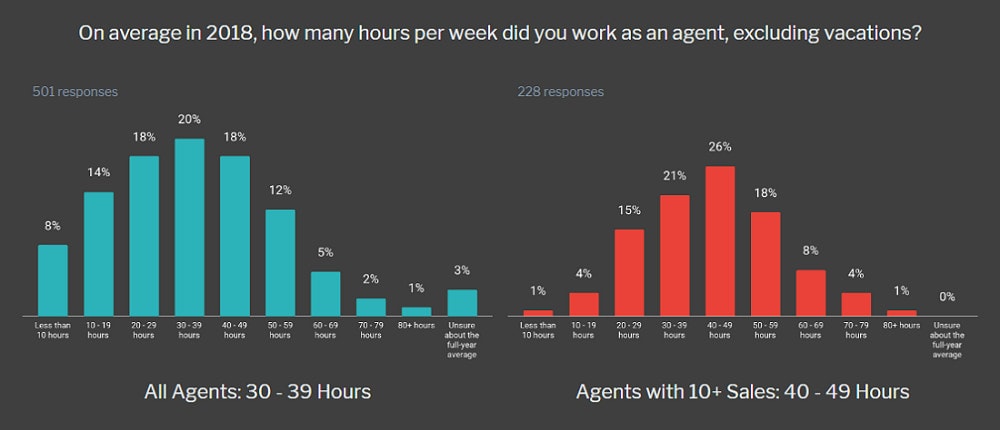
But if you look only at agents with 10+ sales in 2018, then you see workloads rise to 40 hours or more; the challenge for most agents is just not having enough customers, and not knowing how to spend time to meet those customers.
White Agents Far More Likely to Work with White Clients
At the suggestion of Professor Elizabeth Korver-Glenn, who spent much of 2016 and 2017 studying how Houston real estate agents connect with customers of different races and ethnicities, we also asked agents about the race and ethnicity of their last 10 clients. White agents were more than twice as likely to work with white clients:
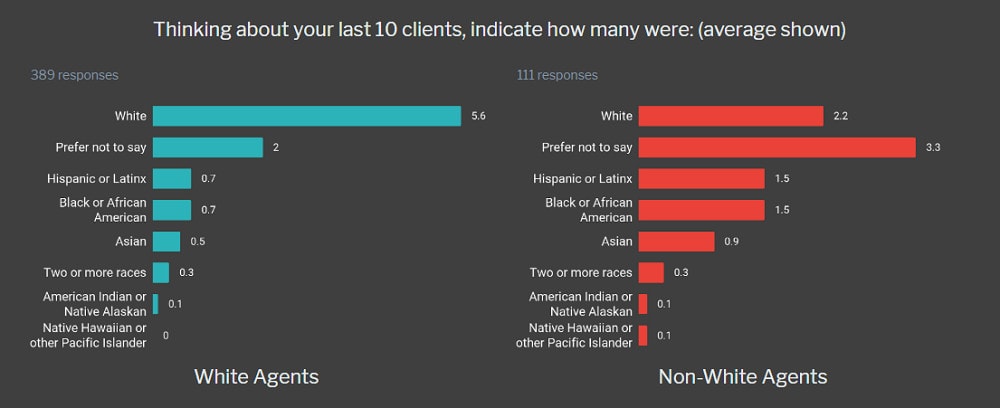
Professor Korver-Glenn has argued that white agents often have privileged access to listings, lenders, builders and other resources that benefit white clients, unwittingly perpetuating the segregation that exists in many of the most exclusive neighborhoods across the U.S.
Our hope has been that the internet will mitigate some of the effects caused by the differing social networks of white and non-white agents; we’ve found that a white customer who normally might have hired a white agent from her social network is perfectly comfortable hiring an agent of color on Redfin.com, particularly when we can show that agent’s reviews and sales performance.
Among Agents of Color, Some Concerns About Racism
We also asked agents about their opinions on race and real estate, and found that on many subjects white and non-white agents held similar views.
To What Extent Do You Agree or Disagree with the Following Statements about Minority Customers in the Real Estate Industry? (“Agree” or “Strongly Agree”)
| Statements | White Agents Agree |
Non-White Agents Agree |
| Minority customers are by and large treated fairly | 64% | 58% |
| As with any group of people, some agents are biased, but most aren’t | 61% | 58% |
| Bias sometimes originates from buyers or sellers, not agents | 43% | 46% |
| Part of my mission as an agent is to serve minority populations | 41% | 53% |
| The only significant difference in service is due to the customer’s wealth, not race | 37% | 49% |
| Bias is pervasive; many agents unconsciously presume minority customers are less desirable | 18% | 33% |
Where the two groups differed the most was about how bias occurs. Non-white agents were more likely to see bias not as the the result of some intentional, overt prejudice from one agent, but as the unintended consequence of unconscious assumptions held by a broader group of people, including buyers and sellers, not just agents.
There may be a larger lesson in this data about how different groups of people in America see bias, with one group looking for explicit statements of prejudice, and the other seeing how an exclusive system has perpetuated itself because anyone with a privilege always wants to hold onto it, and often gets treated better by our society. This is beyond the scope of our discussion today.
13% of Females Report Sexism from Customers, 6% from Colleagues
The last finding is about sexism in the industry; we asked female respondents about their opinions and experiences as women:
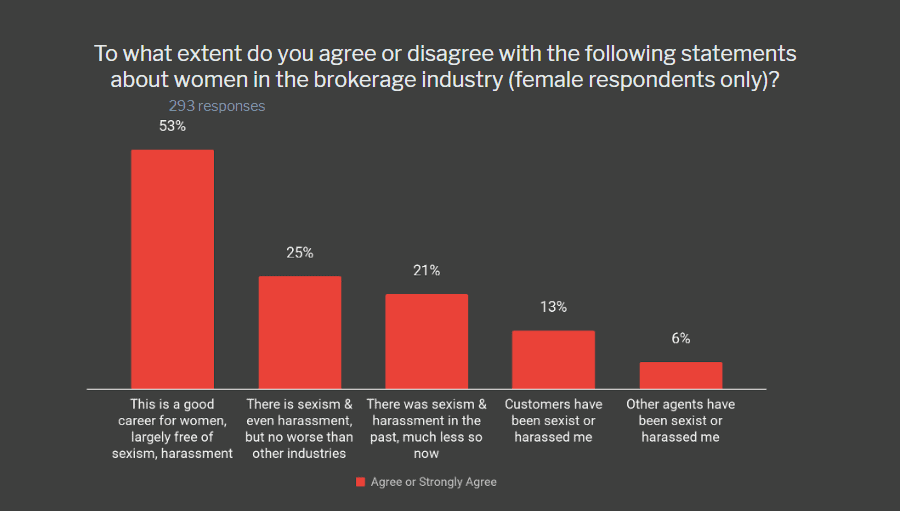
This is an important question, as two-thirds of Realtors are women, and many are alone in houses with customers, or find themselves in situations where a sale is at stake, and another agent or principal in the transaction could easily take offense when a woman objects to sexist or harassing behavior.
The data may seem reassuring at first glance, but when you add it all up, it’s disturbing to see that as many as one in five female agents have faced sexism or harassment from customers and other agents. The only solution is the obvious one, for brokers to fire agents and customers alike who are sexist, and to create a zero-tolerance culture for sexism and harassment. Given how few potentially lucrative jobs are dominated by women, especially how few sales jobs, we have a unique opportunity in our industry to become the absolute best place for hundreds of thousands of professional women to thrive. We should continue to take that seriously.
What It All Means
Having run the survey, we asked ourselves what we’ll do differently as a result. For Redfin, we’re developing a program to pay our senior-most agents more, but with new criteria based on performance, cultural contributions and long-term customer loyalty; we’re also shifting our managers to focus on ramping the earnings of the agents most likely to leave the company, the people new to the profession.
The data on agents’ wariness of internet technology has also changed our thinking. We still believe in software, and in real estate policies on how we should follow up with a customer after a tour or what to prepare for a listing consultation. But we feel more deference to the entrepreneurialism and decision-making of the person closest to the customer, the agent, and more investment in the second phase of software development, when we tailor the tool to the intricate rhythms of an agent’s work.
Most important, the data on career satisfaction and what agents like best about the job makes us believe, more than ever, that our deepest competitive advantage is our mission, to make real estate better for consumers. We just always have to bear in mind that the only way we can make a customer happy is first ensuring that our agents are happy.
The lessons for the broader industry are first that rumors of the agent’s demise are greatly exaggerated, and that consumers who are aware of lower-commission services are still mostly paying agents the fees the agents are accustomed to. The new low-overhead brokerage models have been growing quickly, but with higher agent turnover. For most in our industry, this should be reassuring.
But we should also pay heed to agents’ broad frustration with technology, their struggle to make new lead-generation channels profitable and to meet the demands of a new, more fickle set of young homebuyers.
A New Generation of Agents
Real estate’s future depends on attracting the best and brightest from a new generation of workers. These folks are technically savvy and will only join businesses that have embraced technology. And since the typical indebted college graduate now owes $29,000, we can’t get enough new folks started in real estate without subsidizing the first six to 12 months of their career.
As this generation becomes less engaged in the political and religious institutions that sustained people my age, it becomes more important for their work to have a sense of purpose, and more important for brokerages to embrace a mission grander than any other industry lay claim to, the care of people whose whole lives are in transition.
And even as brokerages seek to reduce office expenses and collaborate online, the sense of belonging and collegiality that comes from a close-knit culture has become more important to millennial workers; we need to invest more, not less, in our workplace culture.
And perhaps most importantly, we owe the people just entering this profession an opportunity not just to generate significant wealth but also to acquire new skills and responsibilities, with the career progression of other industries.
Fortunately, the investments we’re making in technology, people and programs can also create leadership opportunities for this generation; it’s crucial to be able to tell the folks joining Redfin and other brokerages today about the agents or coordinators who have risen to run marketing or industry relations, to develop new programs, design new software or launch new products. Our whole industry is going through massive change; this new generation of talent can in part help us redefine ourselves.
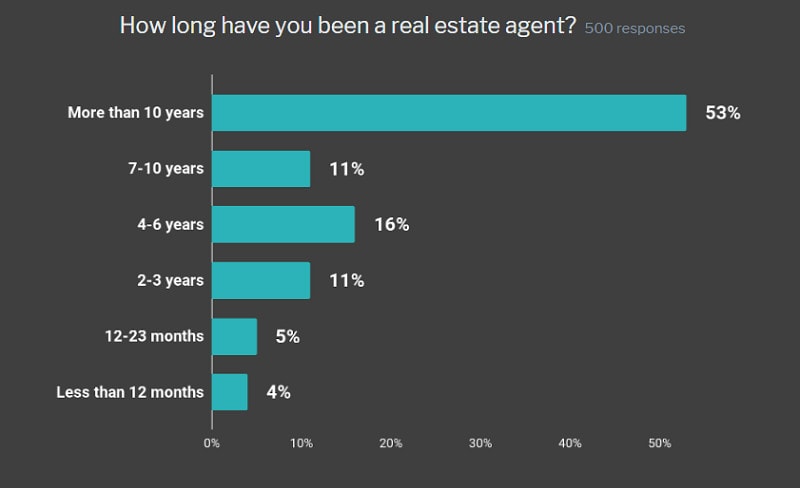

 United States
United States Canada
Canada